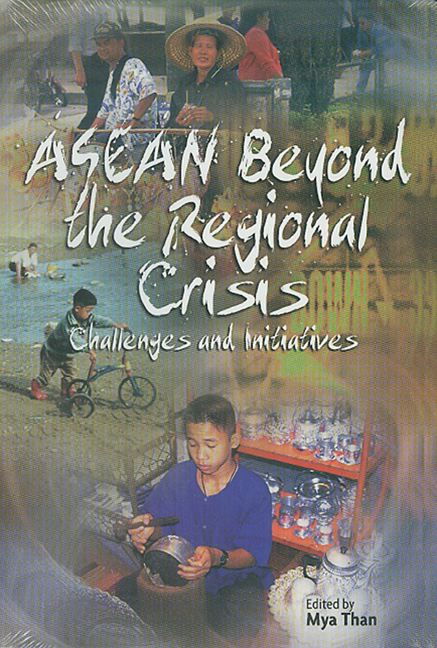Book contents
- Frontmatter
- Contents
- List of Tables
- List of Figures
- Glossary
- Contributors
- 1 ASEAN Beyond the Crisis: A Bird's-eye View
- 2 East Asia: Crisis and Recovery
- 3 Competitiveness and Sustainable Growth in ASEAN
- 4 ASEAN Free Trade Area: Progress and Challenges
- 5 ASEAN Investment Area: Progress and Challenges
- 6 Financial and Macroeconomic Co-operation in ASEAN: Issues and Policy Initiatives
- 7 Food Security in ASEAN
- 8 ASEAN Co-operation and the Environment
- 9 ASEAN and the International Trading System: Regional Trade Arrangement vs. the WTO
- 10 ASEAN and Its Inter-Regional Economic Links
- Appendix I ASEAN's Relevance: Has It Become Questionable?
- Appendix II Is ASEAN Still Relevant? Some Thoughts from a European Perspective
- Index
Appendix II - Is ASEAN Still Relevant? Some Thoughts from a European Perspective
Published online by Cambridge University Press: 03 November 2017
- Frontmatter
- Contents
- List of Tables
- List of Figures
- Glossary
- Contributors
- 1 ASEAN Beyond the Crisis: A Bird's-eye View
- 2 East Asia: Crisis and Recovery
- 3 Competitiveness and Sustainable Growth in ASEAN
- 4 ASEAN Free Trade Area: Progress and Challenges
- 5 ASEAN Investment Area: Progress and Challenges
- 6 Financial and Macroeconomic Co-operation in ASEAN: Issues and Policy Initiatives
- 7 Food Security in ASEAN
- 8 ASEAN Co-operation and the Environment
- 9 ASEAN and the International Trading System: Regional Trade Arrangement vs. the WTO
- 10 ASEAN and Its Inter-Regional Economic Links
- Appendix I ASEAN's Relevance: Has It Become Questionable?
- Appendix II Is ASEAN Still Relevant? Some Thoughts from a European Perspective
- Index
Summary
Changing Institutional Underpinnings in Globalizing Goods and Capital Markets by the Turn of the Century: What Is Exogenous for ASEAN at the External Frontier?
While the number of World Trade Organization (WTO) contracting parties is rising, the number of relevant actors in the world trading order is shrinking. Big players like the United States and the European Union (EU) increasingly act as catalysts for neighbouring countries which harmonize their national trade policies with those of the players. Most countries pursue harmonization via free trade areas (Mexico, Israel, Norway, Switzerland), very few (Turkey) have already gone further by forming a customs union with these players. Other smaller players intend to first implement a customs union among themselves before linking their union to the big players’ trade policy via a regional free trade agreement (such as relations between the Mercado Comun del Cono Sur [MERCOSUR] and the EU). Each of the three paths will lead to economies of scale in trade policies. At the very end, few trading blocs (defined as customs unions) will decide on the outcome of multilateral negotiations, which in fact are already oligopolistic negotiations.
The “open regionalism” style of APEC has not (yet) delivered convincing results in stimulating global liberalization from bottom-up. It needs success stories soon, otherwise it will lose to the traditional preferential EU style of regionalism pursued by the majority of emerging economies in Latin America and Europe, as well as by the ASEAN Free Trade Area (AFTA).
Parallel to the declining number of trade policy actors, the number of relevant currencies traded in the financial markets will also decline. This is not only due to the European Monetary Union but also to the lessons from the Asian economic crisis. These lessons suggest that exchange rate regimes which do not seem sustainable will be tested. Such tests speak against in-between-exchange rate regimes, such as different exchange rate crawls. Thus, the two polar cases (either fixing exchange rates completely [currency boards] or full floating) are credible alternatives. Many small economies with both strong trade and capital links to a major player will take the first (admittedly dangerous) option into more serious consideration than in the past.
- Type
- Chapter
- Information
- ASEAN Beyond the Regional CrisisChallenges and Initiatives, pp. 283 - 288Publisher: ISEAS–Yusof Ishak InstitutePrint publication year: 2001



